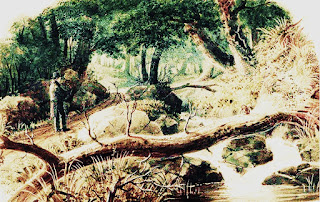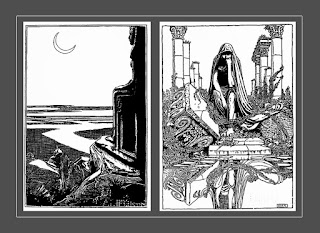The sonic and symbolic journey of “Ulalume”
 |
| The Entrance to a Wood, by Robert Walter Weir, 1836 |
The knock on Edgar Allan Poe’s “Ulalume” (1847) was summed up by Aldous Huxley, who called it “a carapace of jeweled sound”—in other words a beautiful and ornate thing to hear, but a collection of words that do not convey a substantial message or meaning. Huxley was right that the poem is a formidable construction of mesmerizing sound, but I strongly disagree that it’s lacking substance. The point of the poem is twofold: first, the “carapace” is important, and second the allegorical elements of the poem, including the mythical references and imagery, tell us a vivid and moving narrative.
With respect to the sonic components of the poem, I include in this post a first for this blog: I have recorded myself reciting the poem, because it was written to be recited. You can play the sound file at the foot of this post. The poem was commissioned from Poe with the intention that he produce something with oratorical interest, and so it was intended to be read aloud. One of its striking features is its constant repetition of phrases and sentence segments, together with the construction of new sentences that mimic the structure and phrasing of earlier sentences, creating a trance-like effect. This chart showing the first stanza illustrates how many of the verses have this repetition by presenting the repeating or non-changing verses in the type-set passages, as opposed to the new or changing passages in cursive or script:
In the poem, the narrator and his Soul/Sister wander through this dead forest, and are attracted to a mysterious light and a “miraculous crescent” moon in the night sky, which the narrator associates with Astarte, the Greek Venus-goddess associated with romantic love. Poe refers twice to the imagined goddess’ eyes (she has “bright eyes,” and comes with “love in her luminous eyes”), a device that Poe usually reserves to conjure visions of romantic muses—as in “To Helen” (1848), “Annabel Lee” and “For Annie” (both 1849). So, in this dead and “ghoul-haunted” wood, Poe thinks he is getting a call from Love, but his Soul/Sister warns him that it does not seem right: “sadly this star I mistrust.”
Psyche recalls the Greek goddess of the same name, who, in one of her trials, is sent to wander the underworld, where she falls under a spell that puts her in a trance from which Cupid must awaken her, seducing her with a kiss. That episode is echoed in “Ulalume,” when the narrator tries to convince Psyche that everything is fine and that the invitation from the stars is a benign allure: “Thus I pacified Psyche and kissed her/And tempted her out of her gloom/And conquered her scruples and gloom” (emphasis mine). But then, they walk into a trap, because he is actually sleep-walking through a graveyard and realizes it when he stumbles upon the grave of his dead love, “Ulalume,” whom he had buried exactly one year before, “on this very night of last year.” Thus, through this “carapace of jeweled sound” and its mythical imagery, Poe tells us this very poignant story of going through life as through a wasteland, in the wake of the death of a loved one, then being distracted by an alluring temptation, only to have harsh reality impose itself and suddenly bring you right back to the center of that painful fact.
There is one final stanza, usually suppressed, in which Poe supposes that the distraction of the starry lights was an attempt by “the woodlandish ghouls” to divert the narrator from walking up to Ulalume’s grave. I find this supposition especially poignant, because it sheds light on Poe’s conception of gothic horror, which often attributes some redeeming quality to its monsters. Poe uses affectionate descriptors to characterize his “pitiful” and “merciful ghouls.” This reminds me of a line from the 1990 horror film, “Jacob’s Ladder,” about a Vietnam vet whose life has also become a “ghoul-haunted woodland.” Danny Iello tells the Tim Robbins character that, “If you're afraid of dying, and you're holding on, you’ll see devils tearing your life away. But if you've made your peace, then the devils are really angels, freeing you from the world.” Poe’s “Ulalume” sheds light on how the poet used fictional depictions of horror to mask or soothe the horror of real life.





Comments
Post a Comment